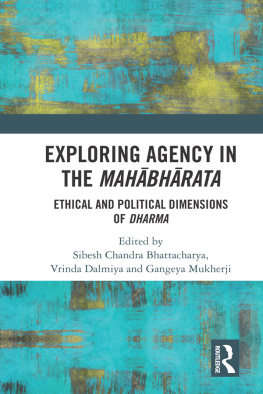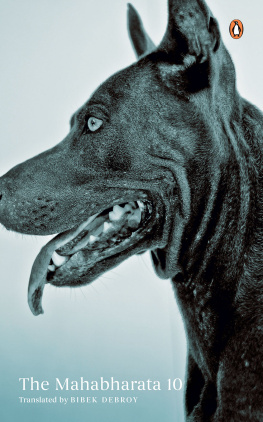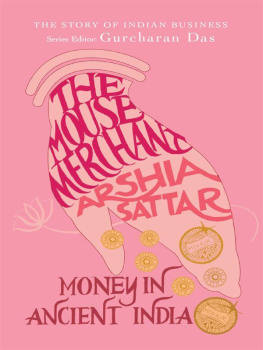Most of us spend our lives wrestling with day-to-day questions of right and wrong that are either left unanswered or have no easy answers. The Difficulty of Being Good turns to the Sanskrit epic, the Mahabharata, in order to answer the question, why be good? and discovers that the epic's world of moral haziness and uncertainty is closer to our experience as ordinary human beings than the narrow and rigid positions that define most debate in this fundamentalist age of moral certainty.
The Mahabharatais obsessed with the elusive notion of dharmain essence, doing the rightthing. When a hero does something wrong in a Greek epic, he gets on with it;when a hero falters in the Mahabharata, the action stops and everyone weighs in with adifferent and often contradictory take on dharma. The epic's characters areflawed; they stumble. But their incoherent experiences throw light on ourfamiliar emotions of anxiety, courage, despair, remorse, envy, compassion,vengefulness and duty. As the Mahabharata's story unfolds in The Difficulty of Being Good, the focus shifts from character tocharacterBhishma, Yudhishthira,Arjuna, Draupadi, Duryodhana, Karna, Aswatthama and Krishnatheir ethical problems, and the significance of these issues for our lives.
Gurcharan Das'sbest-selling book India Unboundexamined the classical aim of artha, materialwell-being. His, his first book in seven years, dwellson the goal of dharma, moral well-being. It addresses the central problem of how tolive our lives in an examined wayholding a mirror up to us and forcing us toconfront the many ways in which we deceive ourselves and others. What emergesin a doctrine of dharma that we can apply to our businessdecisions, political strategies, and interpersonal realationshipsineffect, to life itself.

Gurcharan Das is the author of themuchacclaimed IndiaUnbound, which has been translated into many languages and filmed by theBBC. He writes a regular column for six Indiannewspapers, including the Times of India,and occasionally for Newsweek,the New York Times, the Wall Street Journal and Foreign Affairs. His other books includethe novel A Fine Family, a book ofessays, The Elephant Paradigm, and ananthology, Three English Plays,LarinsShib, 9 Jakhoo Hill and Mira.
Gurcharan Das graduated from Harvard University where he studied philosophy with John Rawls and Sanskrit under Daniel Ingalls. He was CEO of Procter and Gamble India before he took early retirement to become a fulltime writer. He lives in Delhi.
WHY BE GOOD? WHAT EXACTLY IS DHARMA? HOW DOES ONE PRACTISEIT, AND TO WHAT EFFECT?
GURCHARAN DAS'S SUPERB EXPOSITION OF THE DILEMMAS ANDAMBIGUITIES INHERENT IN THE MAHABHARATA SHOWS US HOW WE CAN COME TO TERMS WITHTHE UNCERTAIN ETHICS OF THE WORLD TODAY, A WORLD THAT IS UNCANNILY SIMILAR TO THAT OF THE GREAT EPIC
'The book is a wonderful combination of the scholarly and the personal, the academic and the meditative'
Wendy Doniger
'Through a series of bravura readings of the Mahabharata, Gurcharan Das makes a learned and passionate attempt toinform how the great Indian epic might illuminate our presentday moral dilemmas'
Sheldon Pollock
'A wise, passionate, and illuminating book... one of the bestthings l've read about the contribution of great literature to ethical thought'
Martha Nussbaum
'This book is a kind of miracle'
David Shulman
'A mustread to resolve the moral dilemmas of life'
N.R. Narayana Murthy
'A remarkable tour de force that connects an ageless philosophical epic to the travails of contemporary society'
Nandan Nilekani
'A significant Indian contribution to a new, universal Enlightenment that is not Western in origin or character'
Sudhir Kakar
Cover image courtesy: National Museum, New Delhi
Author photograph by Aradhana Seth
Cover design by Gunjan Ahlawat
ALSO BY GURCHARAN DAS
NOVEL
A Fine Family (1990)
PLAYS
Larins Sahib: A Play in Three Acts (1970)
Mira (1971)
9 Jakhoo Hill (1973)
Three English Plays (2001)
NON-FICTION
India Unbound (2000)
The Elephant Paradigm: India Wrestles with Change (2002)
THE DIFFICULTY OF
BEING GOOD
ON THE SUBTLE
ART OF DHARMA
Gurcharan Das
ALLEN LANE
an imprint of
PENGUIN BOOKS
ALLEN LAN E
Published by the Penguin Group
Penguin Books India Pvt. Ltd, 11 Community Centre, Panchsheel Park, New Delhi 110 017, India
Penguin Group (USA) Inc., 375 Hudson Street, New York, New York 10014, USA
Penguin Group (Canada), 90 Eglinton Avenue East, Suite 700, Toronto, Ontario, M4P 2Y3, Canada (a division of Pearson Penguin Canada Inc.)
Penguin Books Ltd, 80 Strand, London WC2R 0RL, England
Penguin Ireland, 25 St Stephens Green, Dublin 2, Ireland (a division of Penguin Books Ltd)
Penguin Group (Australia), 250 Camberwell Road, Camberwell, Victoria 3124, Australia (a division of Pearson Australia Group Pty Ltd)
Penguin Group (NZ), 67 Apollo Drive, Rosedale, North Shore 0632, New Zealand (a division of Pearson New Zealand Ltd)
Penguin Group (South Africa) (Pty) Ltd, 24 Sturdee Avenue, Rosebank, Johannesburg 2196, South Africa
Penguin Books Ltd, Registered Offices: 80 Strand, London WC2R 0RL, Englan d
First published in Allen Lane by Penguin Books India 200
Copyright Gurcharan Das 200
All rights reserve d
ISBN 978-06-7008-349 -7
This Digital Edition published 2010. e-ISBN: 978-81-8475-019-5
Digital conversion prepared by DK Digital Media, India.
The views and opinions expressed in this e-book are the authors own and the facts are a s reported by him which have been verified to the extent possible, and the publishers are not i n any way liable for the same .
This e-book is sold subject to the condition that it shall not, by way of trade or otherwise, b e lent, resold, hired out, or otherwise circulated without the publishers prior written consent i n any form of binding or cover other than that in which it is published and without a simila r condition including this condition being imposed on the subsequent purchaser and withou t limiting the rights under copyright reserved above, no part of this publication may b e reproduced, stored in or introduced into a retrieval system, or transmitted in any form or b y any means (electronic, mechanical, photocopying, recording or otherwise), without the prio r written permission of both the copyright owner and the above-mentioned publisher of thi s e- book .
ADVANCE PRAISE FOR
THE DIFFICULTY OF BEING GOOD
Through a series of bravura readings of the Mahabharata , Gurcharan Das makes a learned and passionate attempt to inform how the great Indian epic might illuminate our present-day moral dilemmas. Readers will find his analyses of dharma insightful, challenging, and honest doing full justice to the worlds most complex, exciting and honest poem.
This admirable book offers precisely the kind of reflection that the epic itself invitesmoral, political and public. It shows why the Mahabharata is a classic: because it is ever timely. This superb book is knowledgeable, passionate, and even courageous. Grounded in a secure knowledge of the narrative, it raises key moral problemsfrom the doctrine of just war to affirmative action to the nature of sufferingand it makes striking attempts to link these with contemporary discussions and issues, both public and personal.
Next page
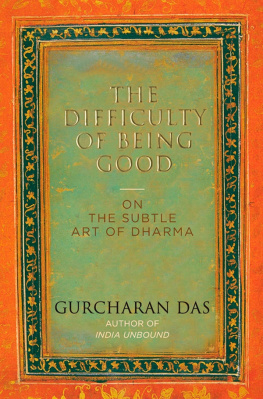
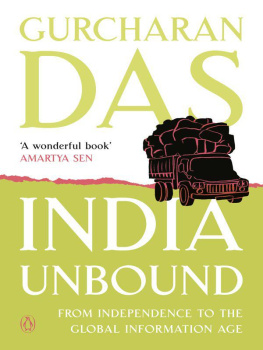
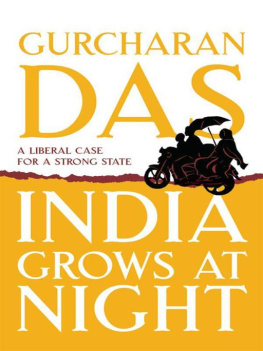

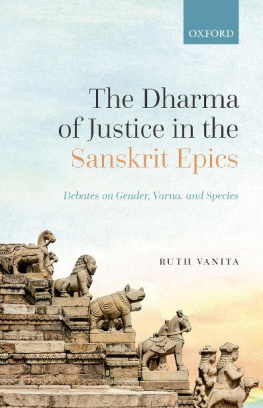
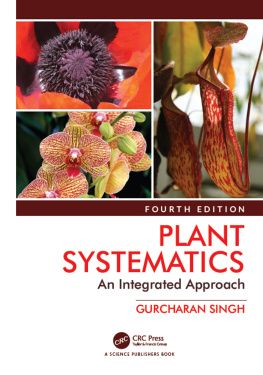
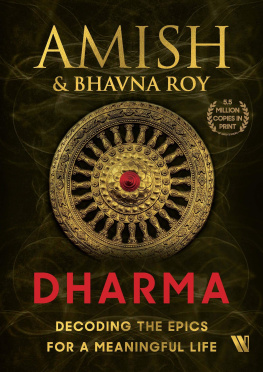
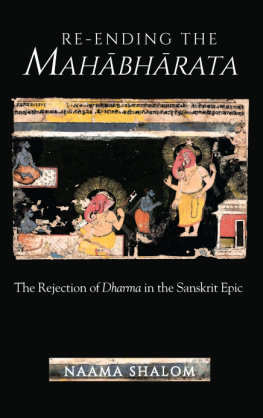
![Krishna Dharma - Mahabharata: [the greatest spiritual epic of all time]](/uploads/posts/book/213378/thumbs/krishna-dharma-mahabharata-the-greatest.jpg)
